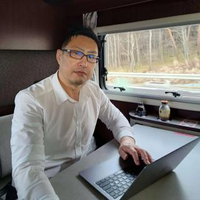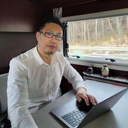(写真は被害が大きく復興が進まない奥能登の9月現在の様子です)
「ふるさとは遠くにありて思うもの、そして悲しくうたうもの」
郷土を思う気持ちをうたった石川出身の詩人、室生犀星の有名な詩だ。東京でうまくいかない、かといって郷土に帰っても温かく迎え入れてももらえない。という室生犀星の悲哀感をうたったものだ。東京にでてきた石川県出身の私に室生犀星のこの詩は時折、とても染みる。
私は年に2,3度は郷土に帰る。父親はすでに他界しており、母親は出身地の福岡で暮らしている。ということで石川に戻る理由はお墓参りしか残っていない。帰る場所もないから郷土に帰ってもホテル暮らしだ。おまけに、むかし経営が失敗して倒産したとき地元で大きな話題になったのが恥ずかしくて、いまだに飲みにもいけない。
でも、年に2,3度は石川に帰る。いつもお決まりのコースを回る。祖父祖母、父親が入っているお墓にいって手を合わせてから、自分が育った家の近くに車を止めて、子供のころ通った公園や学校を見て回る。不思議なもので風景は何も変わっていないのに、いくたびに景色は変わる。
悩んでいる時、岐路に差し掛かったとき、私は必ず郷土に向かいこの景色を見ることにしている。生まれ育った風景をみていると、心から迷いが消えていく。「子供のころ将来何がしたかったっけな」「子供の頃の自分に胸をはって言えるかな」「父親は褒めてくれるよな」「近所の人は今の私にあったら何ていうかな」…不思議と邪念は消え、すべきことが心に浮かんでくる。東日本大震災で南相馬にテレビ局を作ると決めた時も、このコースを歩いた。そして昨日もこの道を歩いてきた。
2週間前に震災の被害が大きかった奥能登にいってきた。無惨な景色が広がる。育った郷土を見ることも思うことも叶わなくなった人たちの気持ちを考えると胸が締め付けられる。「手伝ってこいまいや」と父の声が聞こえる。「がんばってきまっし」と子供の自分が励ましてくれる。「あんたなら、できるわいね」近所のおばさんの優しい笑い声が聞こえる。故郷石川の役に立ちたいと心から願う。
一筆啓上いたします。
「悩んだら、昔の自分に会いに行くといいよ」
"Where Should I Go When I'm Lost?"
(The photo shows the current state of Oku-Noto in September, where the damage was severe, and recovery is still slow.)
"Home is a place to remember from afar, and sing about with sorrow."
This famous poem by the Ishikawa-born poet Saisei Murō reflects the deep longing for one’s hometown. It expresses the sorrow of feeling disconnected, not fully belonging in Tokyo, yet not being warmly welcomed back home either. As someone from Ishikawa now living in Tokyo, this poem often resonates deeply with me.
I return to my hometown two or three times a year. My father has already passed away, and my mother now lives in Fukuoka, where she was born. So the only reason I go back to Ishikawa is to visit the family grave. I don’t have a home to return to, so I stay in a hotel. To make matters worse, when my business failed and went bankrupt, it became big news in my hometown. It’s hard to stroll around proudly and go out for drinks.
Still, I return to Ishikawa two or three times a year. I always follow the same route. I visit my grandparents’ and father’s graves and pay my respects. Then, I park near the house where I grew up and walk around the park and school I used to attend as a child. Strangely, the scenery never changes, but somehow, each time it looks different.
Whenever I’m troubled or at a crossroads, I go back to my hometown and revisit this scenery. Watching the landscape where I grew up clears my mind. "What did I want to be as a child?" "Would the younger me be proud of who I’ve become?" "Would my father praise me?" "What would the neighbors say if they saw me now?" Somehow, these questions dissolve my distractions, and I start to see what I need to do. When I decided to build a TV station in Minamisoma after the Great East Japan Earthquake, I walked this same route. And I walked it again just yesterday.
Two weeks ago, I visited Oku-Noto, which was hit hard by the recent earthquake. Seeing the devastation and thinking about the people who can no longer return to the places they grew up or cherish breaks my heart. I can hear my father’s voice saying, "Go help them out," and my younger self cheering, "Do your best!" I feel the pull to return to my hometown, Noto.
Signing off with today’s final stroke of the brush:
"When you're lost, it's good to go back and meet your younger self."
/assets/images/19093665/original/7883de54-8a71-4793-96dc-176600ce0f10?1725519465)


/assets/images/19093665/original/7883de54-8a71-4793-96dc-176600ce0f10?1725519465)
/assets/images/19093665/original/7883de54-8a71-4793-96dc-176600ce0f10?1725519465)
/assets/images/18388383/original/f892eb99-9ded-487e-97b8-3ce8b9c506de?1721686823)